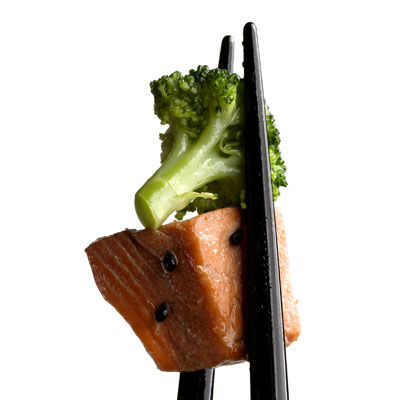 Your past could affect your baby’s future. According to new research from Brown University, more than half of American women of childbearing age exceed the median blood level for at least two of three common pollutants—lead, mercury, and polychlorinated biphenyls (PCBs). These pollutants can harm the brain development of fetuses and babies.
Your past could affect your baby’s future. According to new research from Brown University, more than half of American women of childbearing age exceed the median blood level for at least two of three common pollutants—lead, mercury, and polychlorinated biphenyls (PCBs). These pollutants can harm the brain development of fetuses and babies.
Researchers analyzed data from a Center for Disease Control survey conducted between 1999 and 2004, which involved a nationally representative group of over 3,000 women between the ages of 16 and 49. Nearly 23 percent of study participants, or one in five American women of childbearing age, met or exceeded the median blood levels for all three common pollutants. And nearly 83 percent of the surveyed women exhibited blood levels at or above the median for one or more of the pollutants, which can be passed to fetuses through the placenta and to babies through breast milk.
“Lead, mercury, and PCBs are toxic to the brain and nervous system,” says lead study author Marcella Thompson, Ph.D. “Each chemical has been shown to produce birth defects, developmental delays, and lowered IQ.” If a fetus or young infant is exposed to these pollutants, the risk of toxicity of these chemicals is dangerously high.
It gets even scarier: “By the time a woman’s pregnant, it’s almost too late to do anything about it,” Thompson warns. However, it’s possible that through increased awareness of these pollutants’ origins, women can understand—and take action to protect themselves from exposure to these harmful chemicals.
To limit your pollutant exposure and protect the health of any future babies you may have, take note of the following factors:
Your plates
Colorful pottery may look nice on the dining room table, but beware: It may contain lead. In 2010, the Food and Drug Administration (FDA) confirmed reports from local and state agencies that traditional ceramic pottery made by several manufacturers in Mexico—and labeled “lead free”—in fact contains lead. Your safest bet is to not eat off of any ceramic dishware. If you can’t part from your favorite place settings, test your dishes with a lead test kit. Until you’re in the clear, microwave in glass rather than ceramics, because heat can increase lead leaching, according to the FDA.
Your fish consumption
If you eat fish more than twice a week, you quadruple your odds of having higher levels of mercury and PCBs in your body, according to Thompson. If you’re unsure which fish are the safest to eat, check out the EAP’s fish consumption advisory, which allows you to narrow down your selection based on location, fish species, and pollutant.
Your alcohol consumption
Drinking while your pregnant is dangerous for fetal development, of course, but it turns out your alcohol consumption before pregnancy can also impact the vulnerable stages of the fetus. “We know from toxicology studies that alcohol potentiates the toxicity of mercury and PCBs,” Thompson says. And while the exact reason for this is still under review, its reality is certain, according to Thompson. Drinking too much, even if you’re not planning to someday have a baby, raises the risk for cancer, heart disease, liver damage, and more. Learn how to responsibly enjoy a drink by following these basic guidelines.
Your produce
It’s great that you hit up your local farmers’ market, but if you’re not washing your locally grown purchases, you’re at risk of ingesting potentially contaminated surface soil. PCBs have been found in surface soil at various locations, and if you swallow even a small amount of it, it’s a serious health hazard, according to the Wisconsin Department of Health Services. Here are the best methods on how to bathe, rinse, and soak your fruits and veggies.
Your drinking water
All tap water is not created equal. While the Emergency Protection Agency (EPA) has guidelines for maximum contaminant levels of PCBs, it’s still not 100 percent safe to drink. In order to get to bottom of what’s coming out of your faucet, the EPA suggests contacting your water utility. Each water provider is required to prepare and deliver an annual consumer confidence report—sometimes called a water quality report—for their customers by July 1 of each year. If your water provider is not a community water system, or if you have a private water supply, request a copy from a nearby community water system. For general tap water info, check out these guidelines.
More from WH:
Avoid Air Pollution with These Strategies
11 Hidden Sources of Indoor Air Pollution
Fight Free Radicals with Nuts

Reprogram your metabolism, and keep the weight off for good with The Metabolism Miracle. Order now!




 “, board_url: “http://www.health.com/health/gallery/comments/0,,20331905,00.html”});Comment.render_comments_count();}); Vignette StoryServer 6.0 Mon Aug 20 11:41:40 2012 S
“, board_url: “http://www.health.com/health/gallery/comments/0,,20331905,00.html”});Comment.render_comments_count();}); Vignette StoryServer 6.0 Mon Aug 20 11:41:40 2012 S SweepstakesHealth NewsettersSubscribeHealthy & HappyNews & ViewsFamilyHome and TravelMind and BodyMoneySex and RelationshipsDiet & FitnessFitness • Cardio • Strength • YogaWeight Loss • Diets • Dieting TipsFood & RecipesEating • Cooking • Nutrition • Restaurants and Fast FoodsRecipesBeauty & StyleBeauty • Skincare • Hair • Makeup • StyleCelebrity • Celebrity Tips • Celebrity HealthHealth A-ZAlzheimer’s DiseaseAsthmaBipolar DisorderBirth ControlBreast CancerChildhood VaccinesCholesterolChronic PainCold, Flu, and SinusCOPDCrohn’s DiseaseDepressionDiabetes (Type 2)FibromyalgiaGERDHeadaches & MigrainesIncontinenceMenopauseOsteoarthritisOsteoporosisRheumatoid ArthritisSexual HealthSleep DisordersUlcerative ColitisMore ConditionsMagazineCurrent IssueSubscribeTablet EditionArchiveGive a Gift SubscriptionCustomer ServiceMedia KitAge-Proof Your BonesHome >> Food & Recipes >> Eating >> Nutrition >> Foods to Fuel Your Body >> Vignette StoryServer 6.0 Tue Aug 28 15:27:53 2012 Foods to Fuel Your Body Comments: Add | Read
SweepstakesHealth NewsettersSubscribeHealthy & HappyNews & ViewsFamilyHome and TravelMind and BodyMoneySex and RelationshipsDiet & FitnessFitness • Cardio • Strength • YogaWeight Loss • Diets • Dieting TipsFood & RecipesEating • Cooking • Nutrition • Restaurants and Fast FoodsRecipesBeauty & StyleBeauty • Skincare • Hair • Makeup • StyleCelebrity • Celebrity Tips • Celebrity HealthHealth A-ZAlzheimer’s DiseaseAsthmaBipolar DisorderBirth ControlBreast CancerChildhood VaccinesCholesterolChronic PainCold, Flu, and SinusCOPDCrohn’s DiseaseDepressionDiabetes (Type 2)FibromyalgiaGERDHeadaches & MigrainesIncontinenceMenopauseOsteoarthritisOsteoporosisRheumatoid ArthritisSexual HealthSleep DisordersUlcerative ColitisMore ConditionsMagazineCurrent IssueSubscribeTablet EditionArchiveGive a Gift SubscriptionCustomer ServiceMedia KitAge-Proof Your BonesHome >> Food & Recipes >> Eating >> Nutrition >> Foods to Fuel Your Body >> Vignette StoryServer 6.0 Tue Aug 28 15:27:53 2012 Foods to Fuel Your Body Comments: Add | Read  Credit: Charles Masters
Credit: Charles Masters















 Free Food & Nutrition Email Newsletter
Free Food & Nutrition Email Newsletter
 26 Quick and Tasty Zucchini Recipes2
26 Quick and Tasty Zucchini Recipes2 12 Secrets to Better Orgasms3
12 Secrets to Better Orgasms3 Best Superfoods for Weight Loss4
Best Superfoods for Weight Loss4 Quiz: Do You Have Adult ADHD?5
Quiz: Do You Have Adult ADHD?5 25 Diet-Busting Foods You Should Never Eat6
25 Diet-Busting Foods You Should Never Eat6 The Best Fat-Burning Breakfasts > Take Health magazine with you, try 2 FREE PREVIEW issues Add your commentThe rules: Keep it clean, and stay on the subject or we might delete your comment. If you see inappropriate language, e-mail us. An asterisk * indicates a required field.
The Best Fat-Burning Breakfasts > Take Health magazine with you, try 2 FREE PREVIEW issues Add your commentThe rules: Keep it clean, and stay on the subject or we might delete your comment. If you see inappropriate language, e-mail us. An asterisk * indicates a required field.

![cheating_infographic[8]](http://blog.womenshealthmag.com/thisjustin/files/2012/06/cheating_infographic8.gif)

